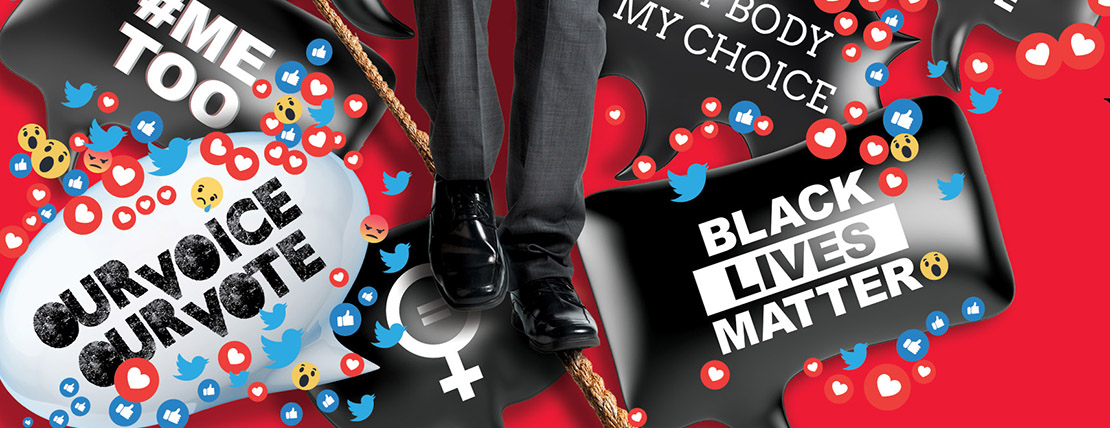On June 24, the U.S. Supreme Court officially voted to overturn Roe v. Wade, ending federal abortion rights. In response, several companies released statements indicating they were committed to helping their employees access health care, with many announcing they would help pay travel costs for workers who live in states where abortions were now banned.
The New York Times assembled a list of those companies, which included large brands such as Starbucks, Disney, Google and Bank of America. In August, Walmart became the latest corporation to announce it would expand the coverage of abortions and related travel expenses in its health care plans, but this was after Walmart CEO Doug McMillon publicly stated they were “working thoughtfully and diligently to figure out the best path forward” to support all of their associates.
Even when a draft of the Supreme Court’s opinion was leaked in May, a few companies were quick to respond. “Overturning Roe v. Wade will jeopardize the human rights of millions of women who stand to lose the liberty to make decisions over their own bodies,” Yelp said in a statement. “Turning back the clock on the progress women have made over the past 50 years will have a seismic impact on our society and economy.”
In an interview with BBC, Yelp’s chief diversity officer Miriam Warren said they decided to speak out because “our employees, our consumers and our customers were looking for us to be vocal on this issue”
“Fundamentally, we’ve taken stances on issues that are issues of human rights,” Warren told the BBC. “[Those affected] are our colleagues, they’re our customers, they’re our consumers. And if we don’t take a stance with the massive platform that we have available to us, it’s really an incredibly missed opportunity on a moral level [and] on a social level.”
Companies making a public stand on social and political matters were once seen as taboo. That is no longer the case, as movements like #Me Too and Black Lives Matter have compelled companies to have a stance on these issues. But companies will have to navigate today’s age of transparency and authenticity, and ask themselves: Is it better to speak up or stay silent?
Benefits and Downsides
Corporate activism can be a powerful tool to attract talent and customers alike, according to Melissa Swift, U.S. transformation leader at Mercer.
Indeed, recent research suggests that groups care far more today than they historically have concerned themselves with the beliefs and actions of the corporations they work for or patronize.
A recent JobSage survey of 1,907 Americans who were employed full-time found that 64% wanted their employers to take a stand on social issues. Percentages were even higher for African Americans (83%), Gen Z (82%), and women (72%), according to the survey results. The poll also revealed that nearly one-quarter of respondents (24%) said they declined a job offer or decided not to apply for a role because of a company’s public stance on social issues.
“Done properly, corporate activism can deepen employee engagement and create a strong sense of purpose in day-to-day work, showing who and what the organization cares about,” Swift said.
John Bremen, managing director and chief innovation and acceleration officer at Willis Towers Watson (WTW), said, “Depending on the type of corporate activism, it can be beneficial to shareholders, customers, employees and the community by creating a stronger company operating in more stable markets with more loyal and more engaged customers and employees. In a best case, this can lead to higher growth, profits and value creation.”
For example, when Russia invaded Ukraine on Feb. 24, companies sprang into action, whether it was to help employees based in Ukraine safely escape the conflict or announce they would continue to pay displaced workers. Other companies chose to send a message by withdrawing their businesses entirely from Russia.
According to a list compiled by Yale University professor Jeffrey Sonnenfeld and his research team, more than 1,000 companies have ceased operations and exited the country — and the list continues to grow.
Mastercard, which operated in Russia for more than 25 years, was one of the companies that came out and took a stand. It made its decision to suspend operations in Russia in early March; a decision that the organization did not make lightly, according to a Mastercard statement.
“These have been and will continue to be very difficult days — most of all for our employees and their families in Ukraine; for our colleagues with relatives and friends in the region; for our colleagues in Russia; and for the rest of us who are watching from afar.
“As we take this step, we join with so many others in hoping for and committing to a more positive, productive and peaceful future for us all.”
Such openness can be appreciated by their employees and the public. And while the logos of Starbucks and McDonald’s are no longer visible in Russia, there are some companies that have stayed put. In this instance, their actions may speak louder than words.
So, in the long run, do companies have a responsibility to speak up on issues that extend beyond the workplace?
“Companies have responsibilities to multiple stakeholders (customers, employees, communities, investors, and regulators) and as such need to weigh the potential positive impact of speaking up with the potential negative impact on those who rely on them,” Bremen said. “Each situation is different and needs to be considered as such.”
Climate change is a case in point. Many big businesses have announced their stance on environmental activism, but those commitments can sometimes ring hollow.
“You can look at a company’s website and see their sustainability report and it will look great,” said Alberto Carrillo Pineda, a founder of Science Based Targets initiative, a global effort to assess corporate plans to reduce emissions, told the New York Times. “But then when you look at what is behind it, you’ll see there is not a lot of substance behind those commitments or the commitments are not comprehensive enough.”
Bremen said, “Speaking up on climate issues that impact their customers, employees and community, as well as their potential ability to manage risks and do business in the future, may be different than speaking up on a social issue where a sizable portion of their customers, employees, and investors strongly disagree and impacts different people’s lives differently.”
When companies take a stand and choose to send a message, they’re leading by example — and that can be a good thing, to a certain degree.
“Business can be a powerful part of coalitions that change the world for the better,” Swift said. “Companies should speak up when there’s a true societal imperative and they can use their power to speak for the powerless; they don’t owe the world commentary on every single minute issue.”
Using Your Platform
If recent events (and recent research) are any indication, it’s clear that more employees, especially the younger workforce, are looking to their leaders to speak up on these issues, but what should companies consider before taking a public position?
“Some simple questions,” Swift said. “What do my employees think? What do my customers think? What do my executives think? What do my potential hires think? Is there a “right side of history? Even if all of these audiences take a particular view, is the opposing view simply morally right?”
Bremen pointed out that employers and HR need to understand that there are multiple sides to any social issue, and they likely will create impact in a way that inspires some people and alienates others.
“It is essential that companies act in a manner consistent with their values and corporate purpose, while also assessing how those values likely align with customers, employees, investors, regulators and the community at large,” he said.
For example, when popular ice cream brand Ben & Jerry’s parent company, Unilever, announced it would continue to sell the product in Israeli settlements in the occupied West Bank under its Hebrew and Arabic names, Ben & Jerry’s rejected the agreement.
In a Twitter thread, the company said it still believed it was “inconsistent with Ben & Jerry’s values for our ice cream to be sold in the Occupied Palestinian Territory.”
“Speaking up on social issues where employees and potential employees disagree will have a direct negative bearing on the company’s relationship with those people,” Bremen said. “That’s simply human nature. While the employees and potential employees may respect leaders for living their values, they may not respect the values themselves.”
And with the rise of activist employees, along with political division, in the workplace, Bremen said the most effective strategy for companies is to create psychological safety for all employees by listening, seeking understanding, withholding judgement, and meeting them where they are wherever possible.
“Transparency and authenticity also help in building bridges across philosophical and ideological differences in an increasingly divided world,” he said. “The most effective strategies also involve working hard to not alienate employees, regardless of their beliefs.”
Swift also encouraged companies to be open and honest with their employees when discussing hot-button issues.
“Don’t try to suppress dissent and create multiple opportunities for folks with an array of views to speak freely and be heard by company leadership,” she said. “One of the worst things companies can do is be seen to stifle employees’ voices.”
Despite the activism taking place in the streets and corporate boardrooms, the tough issues are still present, and companies may no longer afford to look the other way.
In fact, Swift predicts companies will be spending more time on societal issues for the time being.
“But in the longer term, as companies become more adept in managing the demands of more activist stakeholders, the maturity of how they handle these issues will increase,” she said, “and they’ll be able to address this cluster of issues more efficiently.”
Editor’s Note: Additional Content
For more information and resources related to this article see the pages below, which offer quick access to all WorldatWork content on these topics:







